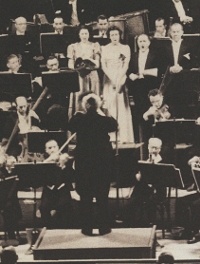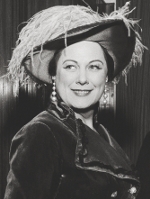 She was born in Pesaro on the 1st of February, 1922, and studied piano at the Conservatory of Parma and afterwards lyric with Maestro Campgalliani. At the “Gioacchino Rossini” high school at Pesaro she studied singing with the famous soprano Carmen Melis.
She was born in Pesaro on the 1st of February, 1922, and studied piano at the Conservatory of Parma and afterwards lyric with Maestro Campgalliani. At the “Gioacchino Rossini” high school at Pesaro she studied singing with the famous soprano Carmen Melis.
She made her debut as Elena in Mefistofele by Arrigo Boito in Rovigo in 1944 She took part in the re-opening concert of the Scala of Milan, directed by Arturo  Toscanini, singing the Prayer from Moses in Egypt by Rossini and in the “Te Deum” by Giuseppe Verdi. On this very occasion Arturo Toscanini defined her voice as the “voice of an angel”.
Toscanini, singing the Prayer from Moses in Egypt by Rossini and in the “Te Deum” by Giuseppe Verdi. On this very occasion Arturo Toscanini defined her voice as the “voice of an angel”.
Renata Tebaldi possessed a prodigiously beautiful, velvety instrument, that of an authentic, lyrical soprano, governed by a technique which permitted her to pass homogeneously from register to register, to have an exemplary legato and spectacular emission (“messe di voce”) able to go from incredibly high pianissimo notes to rivers of sound. An extremely gifted performer with a prestigious stage presence, a lyrical temperament and a tendency towards sentimental abandonment rather than tragic expression, she was able to interpret her roles perfectly thanks to her inspired nobility of phrasing and her high level of musical and stylistic sensibility.
In the traditional repertoire of Verdi's later operas (Aida, Othello, Falstaf), in Puccini which she found particularly congenial (La Boheme and Tosca, Manon Lescaut), in  Cilea's Adriana Lecouvreur, in Giordano's ,Andrea Chénier and Fedora, Renata Tebaldi was able to show, with perfect expressive intuition, a prodigious richness of vocal color and a superb lyrical style. Her style was alien to the blatant extroversion of the “veristi” sopranos, her art was characterized by a taste of classical purity ( all you have to do is listen to her memorable “Vissi d’arte” from Tosca).
Cilea's Adriana Lecouvreur, in Giordano's ,Andrea Chénier and Fedora, Renata Tebaldi was able to show, with perfect expressive intuition, a prodigious richness of vocal color and a superb lyrical style. Her style was alien to the blatant extroversion of the “veristi” sopranos, her art was characterized by a taste of classical purity ( all you have to do is listen to her memorable “Vissi d’arte” from Tosca).
During the first part of her career she faced not only works of Wagner in Italian (her Elsa from Lohengrin and her Elizabeth from Thannauser are both very famous) and Mozart (in particular The Marriage of Figaro), but also historical representations of works of Haendel (Julius Caesar ), Spontini (Olimpia and Fernando Cortez), Rossini (The Siege of Corinth and William Tell) e her first Verdi (Joan of Arc).











 RECONSTRUCTION OF THE CASTLE
RECONSTRUCTION OF THE CASTLE